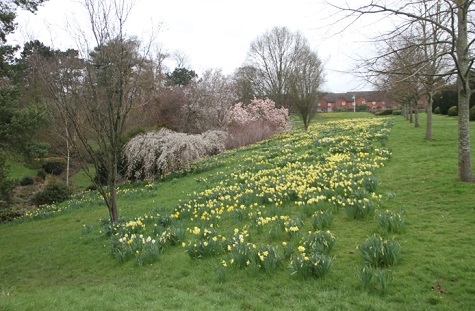
Fields in Trust say over 6.1 million people in Great Britain do not have a park or green space within an accessible ten-minute walk from home, with the total provision of green space per person expected to decline substantially by 2033.
Recent research from the charity who campaign for everyone to have access to a park or green space within a ten-minute walk, now reveals that we need 4,000 new local green spaces by 2033 just to prevent green space provision declining from current levels. The charity warns that without urgent planning reform, the Government’s commitment to providing everyone with an accessible 15-minute walk to nature will fall short.
Fields in Trust has been advocating the need for quality accessible green spaces since they were founded in 1925, recognising that local parks and green spaces bring communities together, providing places for recreation, socialising, tranquillity, and a connection to the natural world. Building on their annual Green Space Index, first released in 2019, the national charity have analysed walkability to local green spaces and found that around one in ten people have difficult walking access to them, with decades of poor planning choices being a driving factor behind the current situation, with proximity to nature only getting worse.
Since its inception, they say the Green Space Index has acted as an annual barometer of publicly available park and green space provision. Some local councils use the Green Space Index to help them understand how much public park and green space residents have access to, and, based on the Fields in Trust proposed minimum requirement of 24 square metres of green space per person, whether this space is sufficient. To date, around 75% of local authorities recognise the importance of having this minimum amount of space, with a substantial number committing to making it a reality.
Earlier this year, the Government set out a target in the 25-year Environmental Improvement Plan, to ensure that everyone has access to green and blue spaces within a 15-minute walk. However, Fields in Trust claims that existing planning rules need a major overhaul for this to have any chance of success. Whilst current planning law does allow local authorities to provide some protection from development for the local parks and green spaces in their plans, there is no mandatory requirement to do so, or to allocate a minimum amount of protection. This has resulted in significant differences of green space provision for each local authority within Great Britain. Additionally, some areas have fewer road crossings, footpaths and cycle routes all cited by the charity as obstacles for less mobile people to access their nearest green space.

As part of the Better Planning Coalition, Fields in Trust has been lobbying for change, campaigning for a specific amendment to the Levelling-up and Regeneration Bill to increase green space coverage and bolster efforts to reach the Environmental Improvement Plan target. This amendment would require local authorities to address health and wellbeing through local plans, by creating policies to improve health trends in their area. It would include a commitment to improving the provision of quality local parks and green spaces, as well as ensuring better walking access in neighbourhoods and more cycle routes where possible.
Fields in Trust, CEO Helen Griffiths says, “What this year’s Green Space Index shows, is that whilst the average green space provision is adequate in some areas, the minimum requirement isn’t being met across the board, meaning access is far from equal for everyone. The inconsistent planning of green spaces is fuelling this divide and needs an immediate and major course correction. It’s vital that the Government now includes an amendment in the Levelling-up Bill which requires all local authorities to commit to a minimum provision of parks and green spaces, and to make neighbourhoods more walkable, so that everyone can enjoy them and reap their numerous health benefits."
In addition to analysing walkability to local green spaces, the Green Space Index assesses the amount of available green space per person in each local authority, compared to the overall provision in Great Britain, with a breakdown of individual nations and the regions within each.
Recent studies by the Office for National Statistics on Public Opinions and Social Trends show that people want to spend more time outdoors, so Fields In Trust argue there is an urgent need for the Government to implement more targeted measures that reduce the imbalance of green space. And whilst measures from the Government such as a £9m Levelling-Up Parks Fund to create 100 new green spaces and the introduction of Green Infrastructure Standards have been welcomed by Fields in Trust, the charity believes the only way to truly maintain green space provision and improve access for everyone, is to secure the sweeping planning reform that will require every council to protect and increase local green spaces everywhere. Based on this year's findings and estimated population growth, Fields in Trust predicts that we will need 4,000 new local green spaces in a variety of sizes and locations by 2033, just to maintain the current average of 30sqm per person, or this average will decline as the population grows.
Clive Betts MP, Chair of the Levelling-up, Housing and Communities Select Committee, and a Trustee of Fields in Trust said, “With the King’s Fund research finding that real terms public health funding has fallen by 25% over just five years, access to free green space with all the benefits it provides, has never been more important. It’s vital that providing these spaces for everyone is a key element of the Government’s Levelling-Up policy, and deeply disappointing that over six million people still don’t have access to green spaces. We must now take the opportunity through the through Levelling-Up measures to bring in policy change that puts health and well-being at the heart of our communities, and the planning decisions that affect them”.